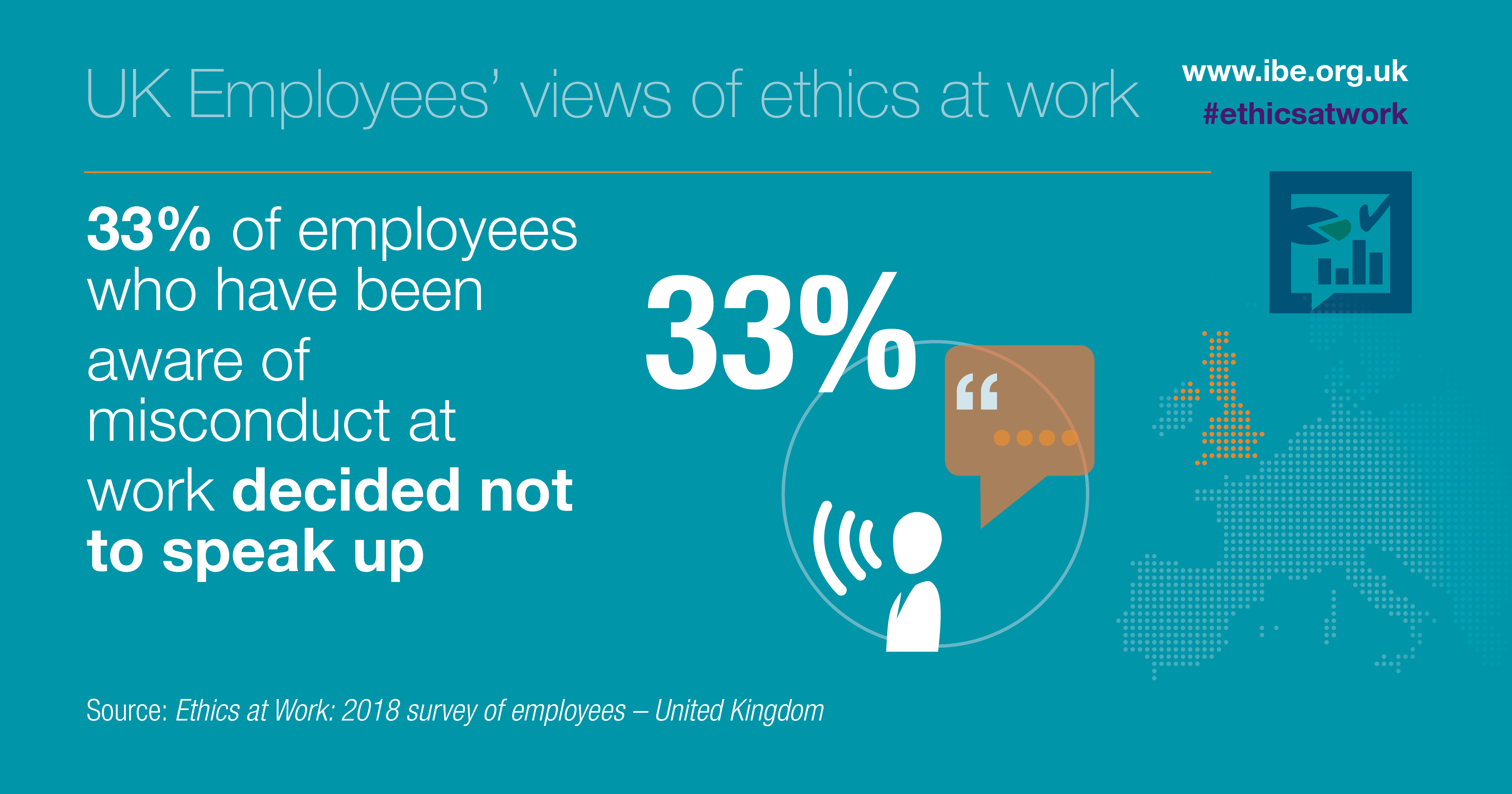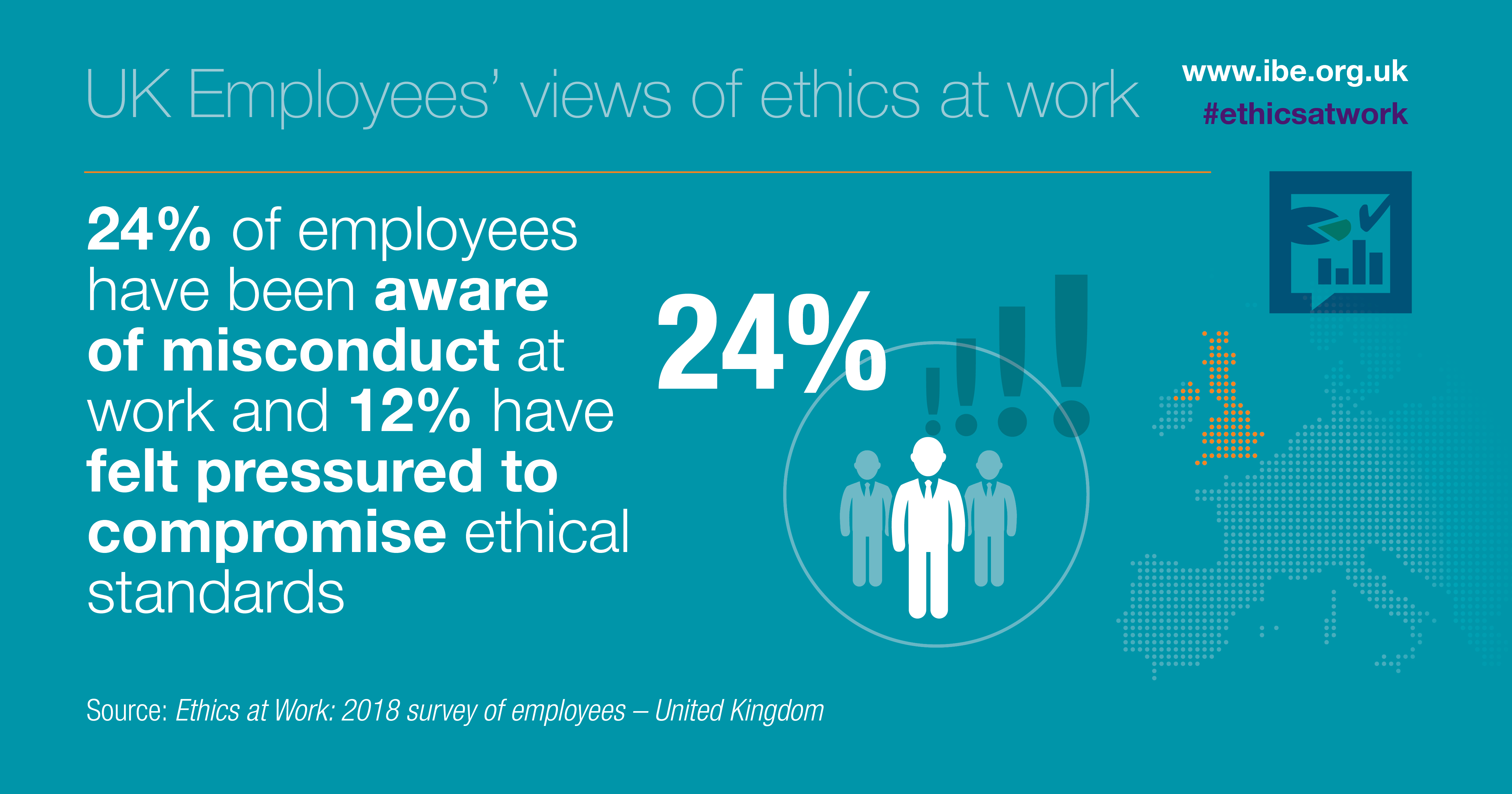UK employees less ethical, reveals Institute of Business Ethics’ survey
Pressure to compromise ethical standards has risen.
UK employees seem to take a more lenient approach than the average European employee to questionable workplace practices.
13th September 2018: UK employees seem to take a more lenient approach than the European average to questionable workplace practices, according to a survey by the Institute of Business Ethics, which looks at employees’ experiences of ethics at their place of work.
An important part of the survey is to establish whether employees are able to identify ethical issues relating to everyday choices that they might have to face in the workplace and whether they apply ethical values to their decision-making.
To answer these questions, respondents to this survey were presented with nine common work-related scenarios and were asked whether or not they considered them acceptable.
Pretending to be sick to take a day off; minor fiddling/exaggeration of travel expenses and charging personal entertainment to expenses are considered the most unacceptable practices in the UK, in line with views from employees across Europe. But a higher percentage of UK respondents say these practices are acceptable. One of these issues (making personal phone calls from work) is considered acceptable by more than half of UK respondents (53%) – the first time in the history of the survey that any issues has been reported as acceptable by more than 50% of UK respondents.
IBE’s Director, Philippa Foster Back CBE says: “Although some of these issues may seem trivial, respondents’ answers are an important indicator of changes in acceptability of practices, as well as where employees’ ethical boundaries lie. Employees either ignoring or being unable to identify the ethical dimensions of a specific situation increases the ethics risk for organisations.”
The Ethics at Work: 2018 survey of employees is the only one of its kind covering Europe which provides real insight into employees’ views on ethics across all sectors and job roles. This new report by the IBE looks specifically at the data from UK employees and compares it with other countries.
The survey, first introduced in 2005, asks employees how they experience ethical dilemmas in their day-to-day working lives. It looks at whether they have witnessed misconduct; whether they have reported it; and what stops them reporting ethical violations. It provides real insight into what supports employees in doing the right thing.
Pressure to compromise ethical standards has risen.
One in eight (12%) respondents in the UK say that they have felt some form of pressure to compromise their organisation’s ethical standards (compared with 16% across Europe). But the UK figure has increased from 8% in 2015. For UK employees, the main source of pressure to compromise ethical standards comes from being under-resourced.
“Although we see this increase in pressure across other countries surveyed, this is particularly relevant to the UK as we are about to enter a period of uncertainty regarding Brexit,” says Philippa Foster Back CBE. “Employees are under more stress to deliver than ever before, and this is increasing the pressure to then cut ethical corners. These figures should be seen as a warning sign to organisations that they need to be more supportive of their employees when it comes to making ethical decisions.”
More encouragingly, a quarter (24%) of UK employees say they have been aware of misconduct, which is below the European average of 30%). However, the overall percentage of UK employees who have been aware of misconduct is the highest it has been since 2005.
Two thirds (67%) of those who had witnessed misconduct had raised their concerns compared with the European average of 54%. This is a 12 percentage point increase from the UK’s 2015 figure and shows an increased willingness of employees to raise concerns.
“Global movements like #metoo and #timesup are having ramifications throughout the workplace,” says Philippa Foster Back, “not just in terms of people speaking up about harassment, but in feeling empowered to raise concerns about other issues. We hope that this is the beginning of speaking up being seen as business as usual.”
#ethicsatwork
ENDS/
To obtain an advanced press copy of the report, or to organise interviews or Op-Eds please contact k.bradshaw@ibe.org.uk
EDITOR’S NOTES
Ethics at Work: 2018 Survey of Employees: UK By Guendalina Dondé
Publication date: 13th September 2018
Free to download from www.ibe.org.uk
About the Ethics at Work survey
The IBE has surveyed British employees since 2005, but given that organisations are increasingly taking an integrated approach at the international level, we have expanded the number of countries included in the research to cover France, Germany, Ireland, Italy, Portugal, Spain, Switzerland and the UK within Europe.
The survey was completed by a total of 6,119 respondents across the eight European countries. It was comprised of a representative sample of about 750 working adults in each country who were aged 18+.
This report presents the findings of public research undertaken by ComRes on behalf of the IBE. ComRes is a member of the British Polling Council and abides by its rules. The survey was undertaken between 5th and 25th February 2018, and full data tables for 2018 and 2015 are available at www.comresglobal.com
The Institute of Business Ethics
The Institute of Business Ethics, whose purpose is to promote high standards of business behaviour based on ethical values, is an important partner to any business wanting to preserve its long-term reputation by doing business in the right way.
For over 30 years, the IBE has advised organisations on how to strengthen their ethical culture by sharing knowledge and good practice, resulting in relationships with employees and stakeholders that are based on trust.
The IBE is a registered charity funded by corporate and individual subscriptions. www.ibe.org.uk @ibeuk
The author
Guendalina Dondé is Senior Researcher at the Institute of Business Ethics. She writes and researches on a range of business ethics topics for the IBE.
Before joining the IBE, she collaborated in developing the code of ethics for the Italian Association of Management Consultants and worked for a European CSR Business Network in Brussels. She holds a Master’s degree in Business Ethics and CSR from the University of Trento in Italy.
She is the author of the IBE survey report Corporate Ethics Policies and Programmes: 2016 UK and Continental Europe Survey and co-author of the 2017 IBE report Setting the Tone: a New Zealand perspective on Business Ethics, the 2017 TEI & IBE Ethics and Compliance Handbook, the 2016 IBE Codes of Business Ethics: examples of good practice and of the French and Italian editions of the 2015 IBE survey Ethics at Work: 2015 Survey of Employees.
She is also responsible for reviewing corporate codes of ethics and related policies, benchmarking them against other organisations’.
The IBE would like to thank the following IBE subscribers for their financial support for this project:
Press release distributed by Pressat on behalf of Institute of Business Ethics, on Thursday 13 September, 2018. For more information subscribe and follow https://pressat.co.uk/
Ethics Business Ethics Employees Risk HR UK Survey Europe Compliance Business & Finance Construction & Property Education & Human Resources Government Manufacturing, Engineering & Energy Medical & Pharmaceutical Opinion Article Public Sector & Legal Transport & Logistics
You just read:
UK employees less ethical, reveals Institute of Business Ethics’ survey
News from this source:







